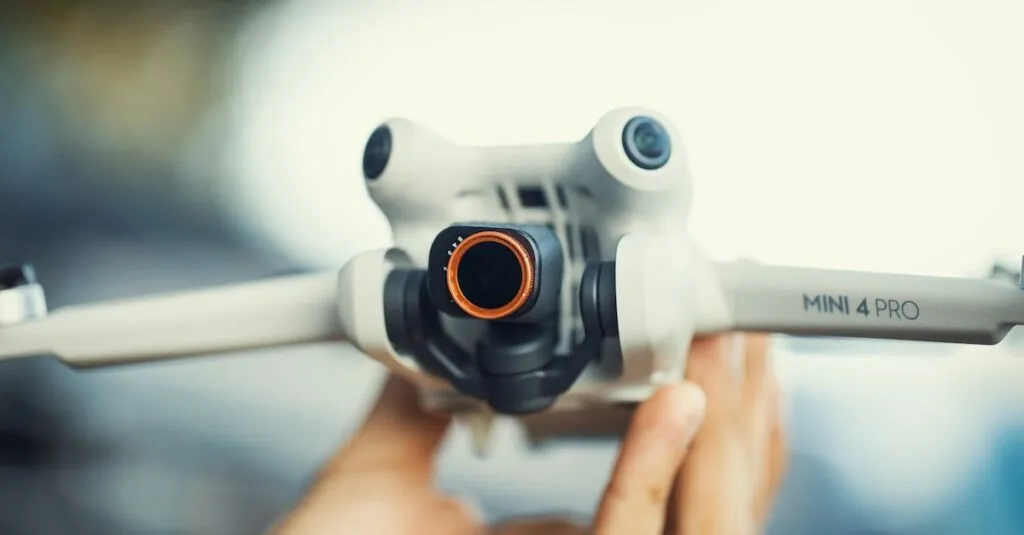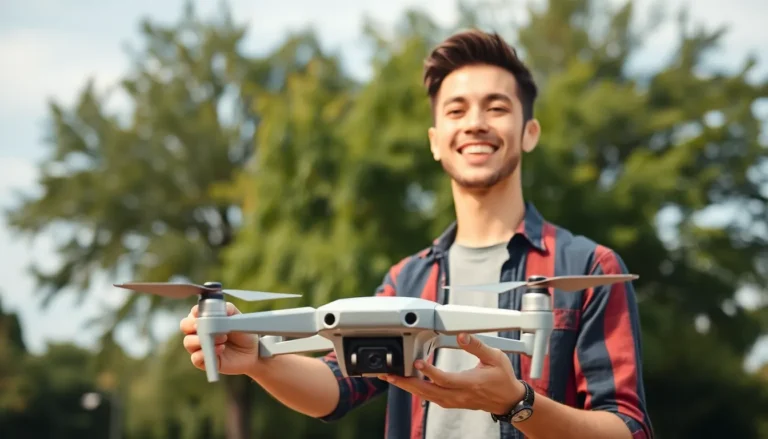Table of Contents
ToggleDrones are buzzing into New Jersey like seagulls at a beach picnic, and they’re not just for aerial selfies or delivering snacks. These high-flying gadgets are transforming everything from real estate to agriculture, making life a whole lot easier—and a bit cooler. Imagine scouting a sprawling garden without stepping into the mud or inspecting a roof without risking a tumble.
Overview of Drones in New Jersey
Drones are transforming operations across New Jersey. Various industries leverage these devices for increased efficiency and safety. Real estate agents use drones for stunning aerial photography, capturing properties from unique angles. In agriculture, farmers implement drones for crop monitoring, enabling precise assessments of plant health.
Construction teams rely on drones for site inspections, offering real-time visuals of progress and potential issues. Emergency services benefit from drones during critical situations, including search and rescue operations, where aerial views enhance coordination. Environmental monitoring also utilizes drones to gather data on wildlife and landscapes, facilitating informed decision-making.
The rise of drone technology has prompted local regulations to ensure safe operation. The Federal Aviation Administration oversees drone usage, outlining rules specific to New Jersey. Registration requirements exist for commercial drones, emphasizing the importance of compliance to enhance safety.
Public interest in drone technology continues to grow, evidenced by educational programs and community events focused on drone operation and safety. Schools and organizations frequently host workshops to teach enthusiasts about drone piloting and its applications.
Job opportunities related to drone technology are emerging, enriching the tech landscape in New Jersey. Positions range from UAV pilots to data analysts, attracting a diverse workforce interested in this innovative field. As technology evolves, the versatility and applications of drones in New Jersey maintain momentum, enhancing various sectors while fostering safety and innovation.
Applications of Drones in New Jersey
Drones serve diverse applications in New Jersey, impacting various sectors significantly. Their effectiveness improves efficiency and outcomes across industries.
Agricultural Uses
Farmers harness drones for precision agriculture in New Jersey. By utilizing aerial imagery, they monitor crop health and yield. Drones conduct soil analysis, enabling timely interventions for pest control and irrigation. Productivity increases due to the ability to survey large areas quickly. With reports indicating a 70% reduction in pesticide use, drones revolutionize farming practices.
Aerial Photography and Videography
Real estate agents leverage drones for stunning aerial photography in New Jersey’s competitive market. High-quality images capture unique property features, attracting potential buyers. Videography enhances listings, offering immersive virtual tours. Consistently, these visuals improve marketing efforts and close rates significantly. Data shows properties with drone footage receive 403% more inquiries, highlighting their value in real estate.
Inspection and Maintenance
Drones play a crucial role in inspection and maintenance tasks across various sectors. Engineers and construction teams utilize drone technology for structural assessments. Through thermal imaging, they detect energy loss and potential faults. Rooftop inspections become safer and easier, reducing the need for scaffolding. Emergency response teams deploy drones for quick evaluations in disaster scenarios, ensuring rapid decision-making and resource allocation.
Regulatory Framework for Drones
Drones in New Jersey operate within a structured regulatory framework to ensure safety and compliance. Regulations come from federal and state levels, each setting specific guidelines.
Federal Regulations
The Federal Aviation Administration (FAA) governs drone operations across the United States. They require registration of drones weighing over 0.55 pounds for both recreational and commercial use. Remote pilots must obtain a Part 107 certification, which includes knowledge tests on airspace, flight operations, and regulations. Additionally, operational limits restrict flights to a maximum altitude of 400 feet, prohibiting flights over people and moving vehicles without special permissions. Moreover, any drone operator must maintain visual line-of-sight during operations to enhance safety.
State and Local Laws
New Jersey complements federal regulations with its own set of laws specific to drone use. State law prohibits drone use in specific areas, such as state parks and over critical infrastructure without prior authorization. Local municipalities may enact additional restrictions, particularly around privacy and trespassing issues. For instance, individuals must ensure they are not infringing on private property when flying drones. Community awareness initiatives focus on educating residents about responsible drone use, promoting adherence to both state and local regulations, ensuring safe flight operations throughout the state.
Challenges Facing Drone Adoption
Multiple challenges hinder the widespread adoption of drones in New Jersey, impacting public perception and regulatory compliance.
Privacy Concerns
Privacy concerns significantly affect drone utilization. Many residents express unease about being observed without consent, leading to calls for stricter regulations. Drones’ ability to capture high-resolution images raises issues regarding personal space and privacy violations. Local governments are increasingly faced with crafting policies that balance innovation and community privacy protection. Some municipalities prohibit drone flights over private property, aiming to alleviate residents’ fears. Regulators often emphasize the importance of ethical drone operation, promoting transparency and community engagement.
Safety Issues
Safety issues pose another challenge for drone usage in New Jersey. Operational hazards can arise from mechanical failures or pilot errors, putting people and property at risk. Drones have also been involved in near-miss incidents with manned aircraft, prompting concerns from aviation authorities. Compliance with FAA regulations is critical for safe operation, ensuring that pilots maintain visual line of sight and adhere to altitude restrictions. Educating the public on safe flying practices remains essential, as it helps reduce accidents. Continuous improvements in technology aim to enhance drone safety, yet public education and robust training programs play a vital role in addressing potential risks.
Future Trends for Drones in New Jersey
Emerging technologies promise to shape the future of drones in New Jersey in several distinct ways. Increased integration into various industries serves as a primary focus, with real estate and agriculture continuing to lead the charge. Expect more real estate agents to adopt advanced aerial imaging as they strive for competitive advantages when marketing properties. Farmers will likely capitalize on enhanced data analytics, leading to improved crop monitoring and resource management.
Advancements in drone technology herald new capabilities, including artificial intelligence-driven data processing and improved autonomous flight systems. These innovations can streamline operations, allowing drones to conduct inspections faster than before. Scaling this technology can lead to significant cost reductions, making drone use more viable for small businesses.
Legislation is also evolving alongside drone technology. New Jersey will likely see more refined regulations to accommodate advancements, ensuring safety and compliance while encouraging innovation. Collaboration between state officials and the FAA will facilitate a standardized operational structure, enhancing aerial service applications within the region.
Public engagement with drones continues to expand through educational programs and community workshops. As more individuals become certified drone pilots, local job opportunities will experience significant growth. Increased interest in drone-related careers will likely attract a diverse talent pool, benefiting sectors like construction, public safety, and environmental monitoring.
Privacy concerns will persist alongside these trends. As drones become commonplace, local governments may implement additional measures to protect residents. Striking the right balance between innovation and privacy will remain essential for ensuring public acceptance and support for drone initiatives in New Jersey.
Drones are reshaping the landscape of New Jersey’s industries by offering innovative solutions that enhance efficiency and safety. As technology continues to advance the potential applications of drones will only expand further.
While challenges like privacy concerns and safety issues remain, ongoing efforts by local governments and the FAA aim to create a balanced approach to regulation. Public interest and engagement in drone technology are on the rise, opening doors to new job opportunities and educational programs.
With a commitment to innovation and responsible use, New Jersey is poised to become a leader in the drone revolution, benefiting various sectors and fostering a culture of safety and creativity.







